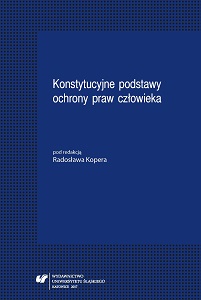Bazy danych DNA a konstytucyjna ochrona praw człowieka
DNA Databases and the Constitutional Protection of Human Rights
Author(s): Katarzyna Wałachowska
Subject(s): Law, Constitution, Jurisprudence, Constitutional Law
Published by: Wydawnictwo Uniwersytetu Śląskiego
Summary/Abstract: DNA databases constitute a detection method for the law enforcement. The purpose of their existence is to make it possible for law enforcement to find the perpetrator. Moreover, they perform preventive and economic functions. However, the creation of such DNA databases can lead to suspected abuses of citizen rights, which is why it is paramount to take into account the social and political aspects of their creation.According to domestic law, genetic data is defined as the data enabling the identification ofa particular person who is subject to protection of personal data. In Poland, such genetic data is collected by the Central Forensic Laboratory of the Police. Those databases contain information regarding particular categories of citizens.In order to obtain genetic material for forensic analysis, it is necessary to infringe upon thebodily integrity of a person. The notion of bodily integrity constitutes a fundamental value forthe standards of protection of the rights of an individual. The procurement of genetic materialdovetails with the constitutional right to privacy, which assumes the supremacy of the interestof the individual over the public interest or the interest of other subjects.In the light of the constitutional protection of the rights and freedoms of the individualin the context of obtaining genetic material and their use in the creation of DNA databases, Article 41, Article 47 and Article 51 of the Constitution of the Republic of Poland rise to particular prominence in this regard. Considering that the state encroaches upon those rights and freedoms, it should therefore guarantee appropriate regulations which allow to effectively protect an interested party if any infringement of their rights by other natural or legal persons as well as state authorities occurred. Moreover, individuals who are disposers of any genetic information should be obligated by the rules of their profession as well as the regulations of domestic law to counteract any attempts at misuse of sensitive information.
Book: Konstytucyjne podstawy ochrony praw człowieka
- Page Range: 273-284
- Page Count: 12
- Publication Year: 2016
- Language: Polish
- Content File-PDF

